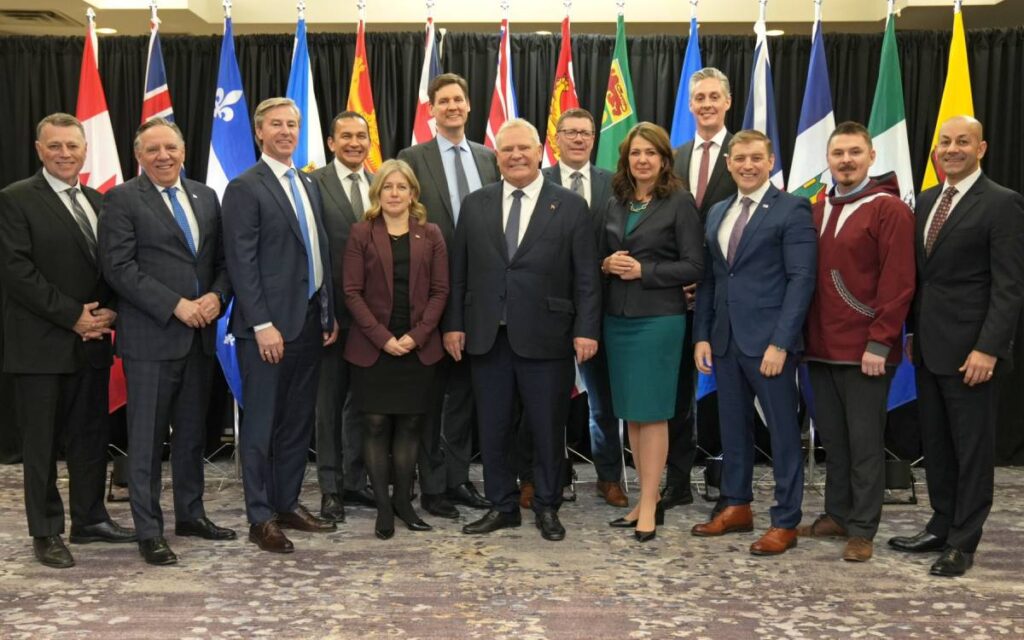
Trump’s threats may be a catalyst to convince Canadian governments to deal with long-simmering issues. Pictured: Canada’s Premiers, with Ontario Premier Doug Ford in centre. Photo Credit: Doug Ford/X.
In the ongoing back-and-forth between President-elect Donald Trump and various Canadian politicians over tariff threats and other pressing issues, there have been a number of odd interventions by various Canadian provincial Premiers. Alberta Premier Danielle Smith has been a consistent and constructive player, not taking a combative stance nor a whiney one as some other premiers have done. Her leadership has been positive and steady, meeting with many different U.S. legislators at the state and federal level and promoting the vital importance of the Canadian oil and gas sector to the US economy. Smith is planning to attend the Presidential inauguration on Jan. 20 and has been criticized for doing so. Given recent events, that decision is looking pretty smart.
When Trump first started making his tariff threats, Ontario Premier Doug Ford came out of the gate with some foolish reactions, as he threatened to restrict electricity exports from Ontario to several U.S. states. He clearly didn’t understand the issue, as doing this would be much more harmful to Ontario electricity consumers than it would to the U.S. states affected. Ford has since gotten on a more solid track, as he is now emphasizing to U.S. officials that our two countries should recognize the real problem, which is China.
China is indeed the problem, as that country actively looks for ways to illegally dump underpriced products into North American markets and unfairly compete with businesses here that face much higher labour costs, taxes, regulations and other red tape. Ford singles out Mexico as the main culprit in the USMCA trade agreement for permitting China to dump their products there and label them made in Mexico, permitting them to be exported to the U.S. and Canada tariff-free. But Mexico is by no means the only problem and Canada needs to own up to our share of the blame.
For years, Canada allowed China to dump various steel and aluminum products, among other manufactured goods, into Canada. These products could then move easily into the U.S. under the NAFTA and subsequent USMCA trade agreements. Many of the businesses in this author’s organization, the Coalition of Concerned Manufacturers and Businesses of Canada (CCMBC), have been negatively impacted by the illegal dumping of these products whose manufacture is not subject to all of the tax, regulatory and other costs imposed by Canadian governments.
When these businesses sought legal assistance to prove that their import competition was illegally dumping products into the Canadian market and seek remedies, they often found the Chinese company involved just rerouted the products through another country and the legal action had to start all over again. It is widely viewed that the Trudeau government’s friendliness toward China delayed action on illegal dumping until pressure from the U.S. got so great that it couldn’t be resisted anymore. It was only late in 2024 after U.S. actions that Canada imposed comparable and significant tariffs on a number of imports from China.
Ford is correct to shift the focus to the problems with China, and emphasize that the best approach Trump could take is to solidify the trading relationship between the U.S. and Canada. We already have a highly integrated and interdependent economy between the two countries which has been a great success for both nations. Ford is, however, wrong to attempt to exclude or minimize Mexico, which is now also highly connected into the positive trade alliance under the USMCA. Mexico does need to clean up its act with respect to Chinese imports, but Canada’s past experience indicates that we are hardly a shining example to follow.
We’re still unsure of what exactly will happen when Trump takes over in less than two weeks, but it won’t be business as usual. Given Trudeau’s apparent abdication of responsibility for any sensible form of governing and the vulnerable economic state in which his terrible policies have left Canada, it is encouraging that some premiers are stepping up to the plate and taking a leadership role for the country. Despite the prevalence of Trump Derangement Syndrome among many Canadians, it may turn out that Trump’s threats will be the catalyst to fix problematic Canadian issues that should have been dealt with by our own governments years ago.

She has published numerous articles in journals, magazines & other media on issues such as free trade, finance, entrepreneurship & women business owners. Ms. Swift is a past President of the Empire Club of Canada, a former Director of the CD Howe Institute, the Canadian Youth Business Foundation, SOS Children’s Villages, past President of the International Small Business Congress and current Director of the Fraser Institute. She was cited in 2003 & 2012 as one of the most powerful women in Canada by the Women’s Executive Network & is a recipient of the Queen’s Silver & Gold Jubilee medals.






